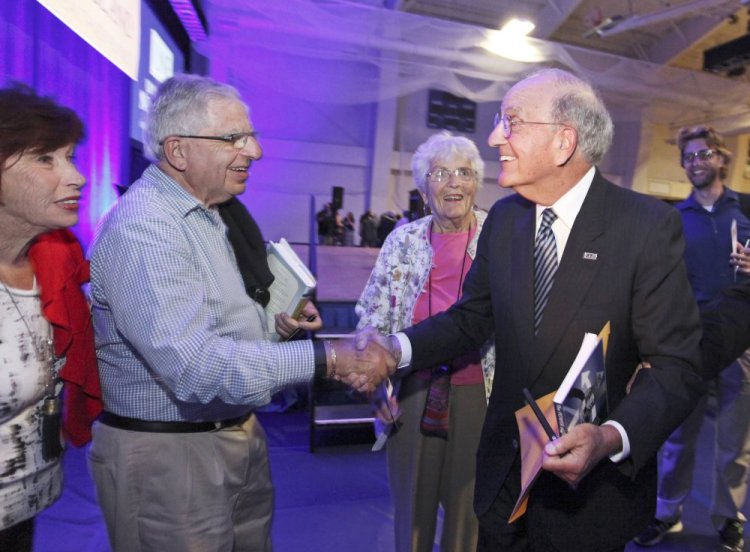BIDDEFORD — In a sweeping prescription to help heal the divided American political system, former U.S. Sen. George J. Mitchell called Tuesday for the end of technology-driven gerrymandering in Congress and condemned the tidal wave of anonymous money flowing into politics since a landmark Supreme Court decision “opened up the floodgates” in 2010.
The recommendations came in the final moments of an address at the University of New England, where Mitchell was the featured speaker at the eighth annual George and Barbara Bush Distinguished Lecture. After highlighting the growing urgency of the threats posed by climate change – especially in the rapidly warming Gulf of Maine – Mitchell responded to questions from the audience. The final query, from UNE professor Amy Davidoff, drew a pointed critique from Mitchell of the way in which technology has been used to distort American congressional districts for partisan gain, and the vast, untraceable sums that have poured into campaigning since the 2010 Citizens United decision by the Supreme Court.

At a UNE event Tuesday, former U.S. Sen. George Mitchell called for ending the flood of “corrupt money’ influencing politics and the partisan gerrymandering of congressional districts. Staff photo by Jill Brady
“We’re drowning in a swamp of corrupt money (and) influence in politics,” said Mitchell, a Democrat who represented Maine in the Senate from 1980 to 1995 and who was Senate majority leader from 1989 to 1995. “I believe that decision will go down in America’s history as one of the worst decisions made by any Supreme Court, because it opened up the floodgates. And here is the sad part. Those who defend that decision and defend money in politics argue that sunlight is a great disinfectant. If you just let the American people know who gave what to whom, then they’ll do the right thing based on that information. But parallel with the Supreme Court’s decision in Citizens United have come a series of other actions (that) have virtually eliminated transparency.”
That trend was apparent during the presidential election in 2016, Mitchell said, when Americans could not fairly decide where the money had come from.
“So we have the worst of both worlds. Billions of dollars pouring into the system, and the decrease and disappearing transparency about who’s giving what to whom,” he said.
Mitchell also highlighted the partisan takeover of the constitutional obligation to redraw congressional boundaries after each U.S. Census.
In 2000, Democrats controlled the majority of state legislatures and were “excessively partisan” in their redrawing of congressional maps, Mitchell said.
“Ten years later, Republicans controlled the majority of legislatures and the difference in technology was like 10 light-years (beyond) what existed in 2000. So they did it to a degree and with precision that was a thousand times more effective than the Democrats in 2000,” he said. “In the House of Representatives in our country today, the general election is virtually meaningless. Of the 435 seats, fewer than 50 are competitive between the parties. The rest are fixed between the parties until at least 2022, and the only question is what happens in those 50 swing seats.”
As a result, the nominating process in each district has overshadowed the general election.
“In the nominating process in the House, a tiny fraction of Americans take part and they tend to be the most interested, the most vigorous, rigid, ideological and partisan,” Mitchell said.
An example, he said, was the “tea party Republicans,” who are now known as the Freedom Caucus.
“They’re not concerned about what happens at the national level,” Mitchell said. “They’re only concerned that someone further to the right will get the nomination, so they move further to the right.”
Rather than conform to the mores of the Senate, former House members elected to the famously deliberative body are bringing their partisanship with them, Mitchell said.
“Until we change those two things, gerrymandering and money in politics, we’re going to get more of the same,” he said.
Matt Byrne can be contacted at 791-6303 or at:
Send questions/comments to the editors.



